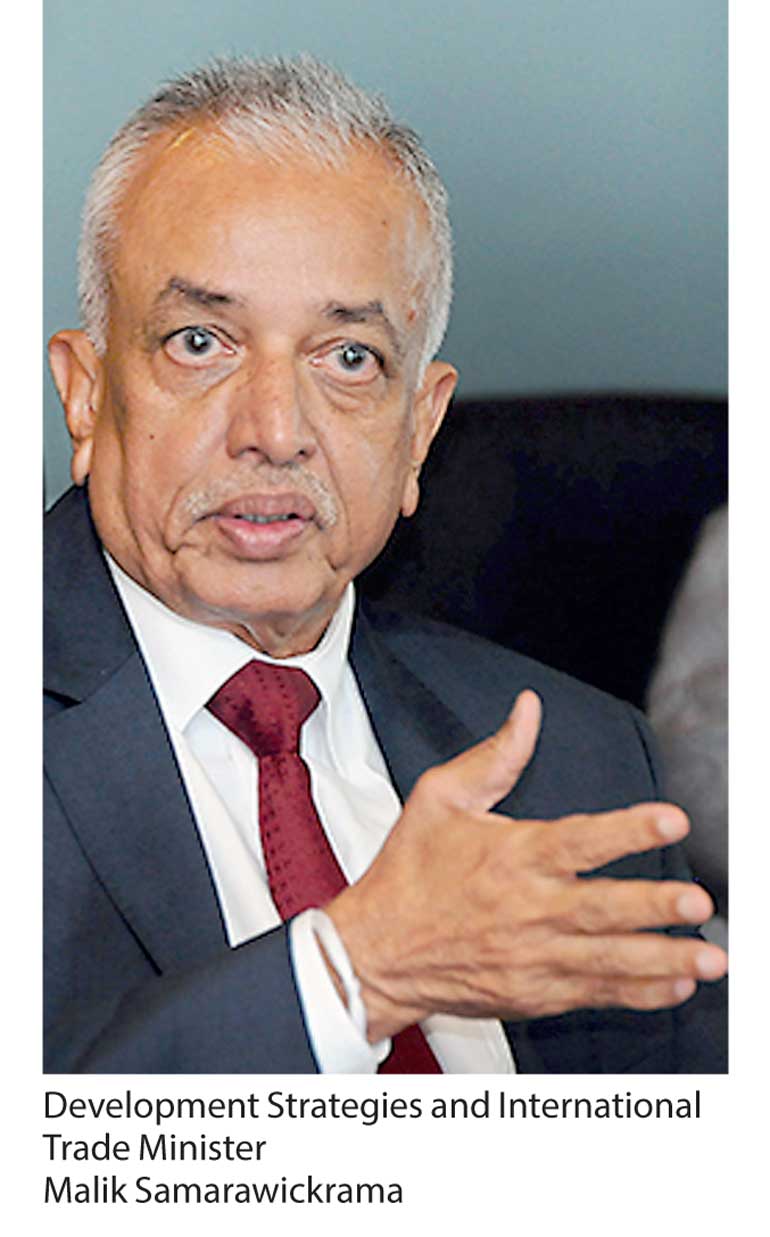Tuesday Feb 24, 2026
Tuesday Feb 24, 2026
Wednesday, 4 April 2018 00:00 - - {{hitsCtrl.values.hits}}

The Development Strategies and International Trade Ministry yesterday responded to a letter by the Association of Technology Professionals (ATP) calling for Minister Malik Samarawickrama to step down from his post and disband the negotiating committee on the proposed Economic Cooperation Technology Agreement (ETCA) with India.
The letter by the ATP, which President Maithripala Sirisena addressed, also said some members of the negotiating committee of ETCA, on behalf of the Sri Lankan Government, had conflicts of interest and appealed to the President to remove Minister Samarawickrama.
In response, the International Trade Ministry pointed out the National Trade Negotiating Committee was approved by the Cabinet and consisted of professionals having significant experience in the relevant fields.
“All members of the negotiating team are Sri Lankan citizens. We deny the allegation that there is a conflict of interest amongst the members and state that no individual member of the team has the right to make a unilateral decision without referring to the authorities concerned. Further, on the request of the stakeholders, considering to establish more transparency in the negotiation process, the Minister has appointed three private sector representatives as observers in all negotiation sessions,” the statement issued by the Ministry said.
The Ministry also said it obtains technical assistance from agencies such as the World Bank, Harvard Center for International Development and International Trade Center (through EU). This has given the opportunity for ministry officials to work in collaboration with foreign and local experts like in any other ministry through ongoing projects with foreign grant assistance.
Currently, similar assistance is received on trade facilitation and the National Single Window, National Export Strategy, Ease of Doing Business reform program and other projects where few foreign experts work in collaboration.
“This ministry from the beginning had consultations, periodically, with Trade Chambers, Industry Associations and Professional Associations to obtain their views. Although the news item says there had been no stakeholder consultations and no transparency has been maintained during FTA discussions, even industry specific consultations had been held with relevant to professional bodies and the private sector on ICT, construction, maritime, hotel and restaurant and other sectors, prior to the preparation of Sri Lanka’s services schedule on the Singapore-Sri Lanka Free Trade Agreement. Independent movement of professionals under Mode 4 has not been committed by Sri Lanka. Only corporate transferees linked to investment have been committed and that too limited initially to two years and subject to a maximum of five years of stay. Furthermore, corporate transferees are limited to Singapore nationals and thus prevent third country nationals based in Singapore coming to Sri Lanka,” it added.
The letter also refers to the loss of millions of dollars to Sri Lanka consequent to the signing of the Singapore FTA and that goods from other origins will come to Sri Lanka via Singapore.
As this ministry has pointed out on several occasions, Sri Lanka will liberalise only 80% of tariff lines and there will be 20% or 1,488 tariff lines out of a total of 7,438 tariff lines not subject to tariff elimination. This list will include domestic industry sensitive items such as confectionary, footwear and other items. Under the tariff liberalisation program, an immediate concession list consisting of 3,719 tariff lines will not have any impact either on revenue or the domestic industry as these tariff lines are currently CESS- and CID-free.
“Often it is mentioned about the large-trade deficit in favour of Singapore and loss of revenue due to tariff liberalisation. It is true that in 2017 Sri Lanka imported goods worth of $ 1,293 Mn against Sri Lanka’s exports of $ 191 Mn to Singapore. However, it should be noted that of the total imports $ 750 Mn was petroleum and petroleum-related products, which will continue to remain in Sri Lanka’s negative list and petroleum products being a high revenue item will ensure revenue to the government. In addition, tobacco, alcohol and spirits which are high revenue items for the government, will also remain in the negative list for ensuring revenue. Furthermore, most of the imports are inputs for domestic manufacturing sector.”
The Ministry said it should be made clear that Sri Lanka did not agree to ASEAN cumulation and therefore there was no such provision in the agreement. Thus, there was no possibility for goods from member countries of ASEAN to come to Sri Lanka through Singapore.
Furthermore, Rules of Origin criteria stipulate that 35% value addition or change of tariff heading at four-digit level should take place in Singapore which will ensure value addition or processing takes place in Singapore, before exporting to Sri Lanka. Although Singapore engages in entrepot trade, Rule of Origin in the agreement will prevent goods merely being transshipped via Singapore. Any interested party can now access the text of the SLSFTA agreement available on the website of the ministry (http://modsit.gov.lk/).
On ETCA, the ministry mentioned that a feasibility study was undertaken by a study team in collaboration with the Institute of Policy Studies which provides inputs to the negotiation process. ETCA negotiations commenced in 2016 and so far eight rounds of negotiations have been held and the ministry said it wished to assure that negotiations were not done in haste.
The declared position of the Government was that the independent movement of professionals under mode 4 would not be opened and this position remained unchanged and this has been well communicated during the consultations.
The opening of labour markets or workers coming to Sri Lanka, be it India or any other country, is completely outside the scope of ETCA and will be come under the purview of the immigration laws of the country, the statement went on to say.